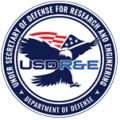DOD Announces 2023 Laboratory-University Collaboration Initiative Fellows
The Department of Defense today announced the 2023 class of the Laboratory-University Collaboration Initiative (LUCI).
LUCI fellows are accomplished researchers within defense laboratories who seek to collaborate with prominent DOD-funded academic researchers – either recipients of the Vannevar Bush Faculty Fellowship or principal/co-principal investigators under the Multi-Disciplinary University Research Initiative. Each awarded LUCI project will be eligible to receive up to $200,000 per year for three years.
The selection process for this competitive fellowship engaged program officers from the U.S. Army, Navy, and Air Force; leaders from the Office of the Under Secretary of Defense for Research and Engineering’s Basic Research Office; and technical experts from supporting defense contractors. From 57 white papers, evaluators chose 19 that demonstrated the potential for creative, high-impact research in topic areas critical to the DoD. After an interview phase, the BRO selected the following 12 projects, with 18 total principal investigators from the Service laboratories, as the Department’s 2023 LUCI cohort:
| Principal Investigator | Topic | Project Title | Collaborator |
|---|---|---|---|
| Spencer Olson (Air Force Research Laboratory) | Quantum Information Science | Micro-Optical Cavities for Scalable Coherent Coupling | Monika Schleier-Smith; Jon Simon (Stanford University) |
| Steven Rodriguez (Naval Research Laboratory) | Applied Math | Low-Dimensional Manifold Discovery from Unstructured Data of Meshless Multiphysics | Steven Brunton (University of Washington) |
| Meagan Small and Jordan Baumbach (Army Research Laboratory) | Fundamentals of Bio-engineering | Evolution of Fungal Enzymes for Degradation of Polymeric Materials | Ahmad Khalil (Boston University) |
| Mulugeta Haile (Army Research Laboratory) | Other | Biomimetic Vestibular Physical Reservoir Computing as a Universal Stability Controller for Nonlinear Dynamical Systems | Ying-Cheng Lai (Arizona State University) |
| Ibrahim Boulares and Owen Vail (Army Research Laboratory) | Materials | Beyond the 2D Limit: Band Engineered Control of Exciton Condensates in Coupled van der Waals Systems | Philip Kim (Harvard University) |
| Tanya Tschirhart (Naval Research Laboratory) | Fundamentals of Bio-engineering | Connecting Electron Flow and Gene Expression in Cells for Multi-Channel Electrogenetics | Caroline Ajo-Franklin (Rice University) |
| James Delehanty (Naval Research Laboratory) | Cognitive Neuroscience | Nanoscale Sensors and Actuators for Advanced Measurement and Control of Neuronal Cell Function In Vivo | Rafael Yuste (Columbia University) |
| Corey Trahan and Mark Loveland (Army Research Laboratory) | Networks/ Artificial Intelligence | Modeling Coastal Hydrodynamics Using Neural Operators | George Karniadakis (Brown University) |
| William Kennedy and Dass Chandriker (Air Force Research Laboratory) | Materials | Circularly Polarized Lasers Using Intrinsically Chiral Hybrid Perovskite Crystals | Nick Kotov (University of Michigan) |
| Patrick Callahan and Keith Knipling (Naval Research Laboratory) | Materials | Understanding the Deformation Behavior of Refractory High Entropy Alloys | Mitra Taheri (Johns Hopkins University) |
| Blair Connelly and George de Coster (Army Research Laboratory) | Materials | Deconvolution of Topological Photocurrents: Ultrafast Spin Flips Without Uncertainty | Mercedeh Khajavikhan; Demetrios Christodoloudis (University of Southern California) |
| Manoj Kolel-Veetil (Naval Research Laboratory) | Other | AI/ML-Assisted Advancement of Degradation Science of Per- and Polyfluoroalkyl Substances (PFASs) on 2-Dimensional Nanoconfining Substrates | Surya Kalidindi (Georgia Institute of Technology) |
Administered out of the BRO, the LUCI program fosters collaboration between DoD laboratory scientists and DoD-funded university scientists in priority defense research areas including applied mathematics, cognitive neuroscience, engineering biology, novel materials, quantum information science, and manufacturing science.
“We are delighted to contribute to the Department’s core mission by supporting a science and technology workforce that can excel in basic research, shape innovative research directions, and access the most advanced work under way in the broader scientific community,” said Dr. Bindu Nair, director of the Basic Research Office. “LUCI allows our lab scientists to pursue necessary high-risk research by giving them time to develop long-term ideas while tapping the creative energy and innate curiosity of university partners.”

